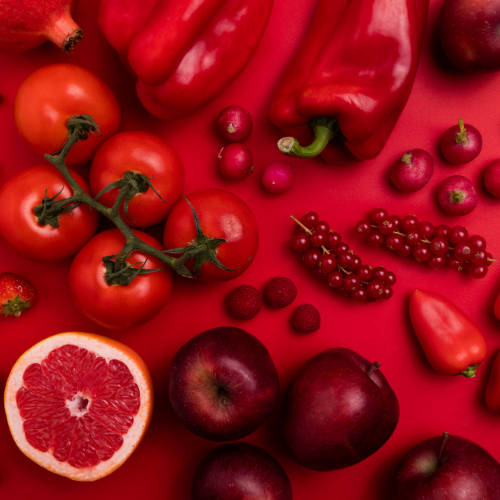
9 Red Foods To Stop Acid Reflux
If you’ve ever experienced the discomfort of acid reflux, you know how disruptive it can be to your daily life.
That burning sensation in your chest, the regurgitation of stomach acid into your throat—it’s not a pleasant experience.
But what if we told you that there’s a colorful solution to this problem?
Acid reflux is a common digestive issue that affects millions of people.
It occurs when stomach acid flows back into the esophagus, causing irritation and discomfort.
While there are medications to manage acid reflux, dietary changes can play a significant role in reducing symptoms and improving your quality of life.
Now, let’s discover how these red foods can be your allies in the battle against acid reflux!
#9: Red Bell Peppers.
Red bell peppers are packed with antioxidants, which act as protective shields for your cells, helping to combat damage caused by free radicals.
Antioxidants are known for their anti-inflammatory properties, which can significantly alleviate acid reflux discomfort.
This antioxidant-rich quality is significant because it can help alleviate the irritation in your esophagus associated with acid reflux.
Red bell peppers are also low in acidity, unlike their fiery and acidic cousins, making them a gentler choice for your delicate esophagus.
High-acid foods often exacerbate acid reflux symptoms, leading to heartburn and discomfort.
Incorporating red bell peppers into your diet, whether by adding them to salads, stir-fries, or simply enjoying them as crunchy snacks, can provide your esophagus with a soothing, anti-inflammatory shield.
So, consider including red bell peppers as a flavorful choice for managing acid reflux.
These vibrant veggies don’t just add color to your plate; they offer respite to your digestive system.
#8: Cranberries.
Cranberries, those tart red berries often associated with holiday meals, possess a unique ability that can benefit individuals dealing with acid reflux.
They are known for their capability to inhibit the growth of H. pylori bacteria, which has been linked to acid reflux.
H. pylori, short for Helicobacter pylori, is a type of bacteria that can colonize the stomach lining.
While not everyone with H. pylori will experience acid reflux, it is a common risk factor for various gastrointestinal issues, including acid reflux and gastritis.
These bacteria can disrupt the balance of the stomach’s natural acids and lead to symptoms like heartburn, indigestion, and a burning sensation in the chest.
Cranberries, with their natural antibacterial properties, can help combat H. pylori in the digestive system.
This can contribute to a reduction in the prevalence of acid reflux symptoms.
While cranberries alone may not be a standalone solution for acid reflux, incorporating them into your diet can certainly complement other dietary and lifestyle modifications aimed at managing acid reflux.
Enjoying cranberries in various forms, such as cranberry juice (preferably with no added sugars), dried cranberries in salads or oatmeal, or whole cranberries in sauces, can be a flavorful and potentially helpful addition to your acid reflux management strategy.
#7: Pomegranates.
Pomegranates, with their ruby-red seeds and sweet-tart flavor, offer more than just a delightful burst of taste.
They are rich in antioxidants, which play a vital role in reducing inflammation in the esophagus, a key benefit for those dealing with acid reflux.
Inflammation in the esophagus is a common factor in acid reflux, often leading to symptoms like heartburn, regurgitation, and chest discomfort.
Antioxidants in pomegranates act as inflammation-fighting superheroes, helping to calm the irritated tissues in the esophagus.
Additionally, pomegranates can contribute to overall digestive health.
They contain dietary fiber, which aids in regular bowel movements and ensures that food moves smoothly through the digestive tract.
This can be particularly helpful in preventing the backflow of stomach acid into the esophagus, a primary cause of acid reflux.
While specific studies on pomegranates and acid reflux are somewhat limited, their antioxidant-rich and fiber-packed profile suggests their potential benefits for individuals seeking relief from acid reflux symptoms.
Incorporating pomegranates into your diet, whether by enjoying the seeds as a snack, adding them to salads, or sipping on pomegranate juice, can be a flavorful way to promote digestive health and reduce esophageal inflammation.
#6: Red Apples.
Red apples, with their crisp texture and sweet flavor, not only make for a delightful snack but also provide valuable support for maintaining digestive health and preventing the onset of acid reflux symptoms.
One of the key factors in managing acid reflux is ensuring proper digestion and preventing stomach contents from flowing back into the esophagus.
Red apples excel in this regard due to their high fiber content.
Fiber acts like a digestive regulator, promoting regular bowel movements and ensuring that food moves efficiently through the digestive tract.
This helps prevent the backflow of stomach acid, a primary cause of acid reflux.
Furthermore, red apples are considered a low-acid fruit, making them a gentle choice for individuals with acid reflux concerns.
High-acid foods can often exacerbate acid reflux symptoms, leading to discomfort and irritation.
Opting for low-acid foods like red apples can be a kinder choice for your delicate esophagus.
Including red apples in your diet, whether as a healthy snack or a versatile ingredient in salads and desserts, can contribute to maintaining digestive regularity and reducing the risk of acid reflux symptoms.
#5: Raspberries.
Raspberries, those delightful and vibrant red gems, are more than just a tasty treat; they offer significant benefits for individuals dealing with acid reflux.
One of the standout features of raspberries is their exceptional fiber content.
Fiber plays a pivotal role in digestive health, and for those struggling with acid reflux, it can be a valuable ally.
This fiber-rich fruit supports regular bowel movements and helps prevent food from lingering in the digestive tract, reducing the chances of stomach acid flowing back into the esophagus, a common trigger for acid reflux.
Beyond their fiber content, raspberries are also brimming with antioxidants.
These antioxidants are like an army of tiny defenders for your digestive system.
They combat harmful molecules known as free radicals and are known for their anti-inflammatory properties.
This anti-inflammatory quality can be particularly helpful in soothing the irritation often associated with acid reflux.
Incorporating raspberries into your diet, whether as a topping for yogurt, a refreshing addition to salads, or simply enjoyed on their own, can provide you with a delicious and nutritious option for managing acid reflux.
We are halfway through our countdown; before we continue, please don’t forget to click the thumbs up button and subscribe to our channel to help us reach more people.
#4: Red Onions.
Red onions, despite their pungent flavor and reputation for causing tears, hold a surprising secret that can be immensely beneficial for those dealing with acid reflux.
The key player in red onions is a compound called quercetin.
Quercetin is a powerful antioxidant known for its anti-inflammatory properties.
This compound can work wonders in reducing the irritation and discomfort often associated with acid reflux.
Quercetin acts as a natural shield for your esophagus, helping to calm the fiery sensation caused by stomach acid creeping back up.
So, the next time you’re tempted to pass on the onions, you might want to reconsider.
Incorporating red onions into your meals can add not only a unique and robust flavor but also an element of potential relief from acid reflux symptoms.
#3: Watermelon.
Watermelon, the quintessential summer fruit, isn’t just a refreshing treat on a hot day; it can also be a soothing choice if you’re prone to acid reflux.
One of watermelon’s standout features is its exceptionally high water content, which can help keep your stomach well-hydrated.
Adequate hydration is essential for maintaining a balance in your stomach’s acid levels, reducing the likelihood of acid reflux.
By staying well-hydrated with watermelon, you’re essentially diluting stomach acid, making it less likely to flow back into the esophagus and cause that uncomfortable burning sensation.
While watermelon alone may not be a complete solution for managing acid reflux, it can be a valuable addition to your dietary strategy.
Moreover, watermelon is a source of vitamins A and C, as well as antioxidants like lycopene, which contribute to overall digestive health.
These nutrients and antioxidants can play a role in maintaining the integrity of your esophagus and reducing inflammation.
#2: Strawberries.
Strawberries, those delightful red gems, are not only a sweet treat but also a smart choice if you’re seeking natural ways to manage acid reflux.
What sets strawberries apart is their unique combination of being low in acidity and high in fiber.
This makes them a double win for individuals looking to alleviate acid reflux symptoms.
Let’s break it down:
Strawberries are naturally low in acidity.
This means they are less likely to contribute to the irritation of your esophagus and the uncomfortable heartburn associated with acid reflux.
They are also packed with fiber.
Fiber helps regulate digestion by promoting regular bowel movements and preventing constipation.
When your digestive system is functioning smoothly, there’s less pressure on your stomach, reducing the likelihood of stomach acid flowing back into the esophagus.
Additionally, strawberries are rich in vitamins, particularly vitamin C, and antioxidants like quercetin and anthocyanins.
These compounds contribute to overall digestive health and may help reduce inflammation in the esophagus.
#1: Red Cabbage.
Topping our list as the champion in the battle against acid reflux is the unassuming yet powerful red cabbage.
This cruciferous vegetable may not wear a cape, but its low acidity and impressive abilities to regulate stomach pH make it a superhero for managing acid reflux.
Now, let’s break down why red cabbage takes the number one spot in our lineup.
To begin with, red cabbage is remarkably low in acidity.
This is a key feature that sets it apart from high-acid foods, which can often exacerbate acid reflux symptoms.
By opting for low-acid foods like red cabbage, you’re offering your delicate esophagus a gentler experience.
What makes red cabbage particularly effective is its potential to help regulate stomach pH.
The natural compounds in red cabbage can contribute to maintaining a balanced pH level in your stomach.
This balance is crucial because it reduces the likelihood of stomach acid surges that can lead to uncomfortable reflux.
Incorporating red cabbage into your meals can be as simple as shredding it for salads, coleslaw, or stir-fries.
Its versatility in both raw and cooked forms makes it an easy addition to your diet.
And there you have it— red foods that can be your allies in the battle against acid reflux.
These colorful and flavorful options can not only soothe your esophagus but also promote overall digestive health.
Remember, while incorporating these foods into your diet, it’s essential to listen to your body and consult with a healthcare professional if you experience persistent acid reflux symptoms.









